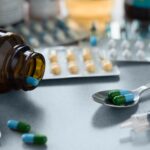Standard treatment for hemophilia B involves replacing the missing clotting factor so that the blood can clot properly. This is called factor 9 replacement therapy. The two main replacement therapies are plasma-derived factor concentrates and recombinant factor concentrates, which are infused into the bloodstream via a vein in the arm.
In both cases, infusions of the concentrates are done prophylactically, meaning they’re done on a regular basis to prevent bleeding episodes, according to the Centers for Disease Control and Prevention (CDC). However, if you have severe hemophilia B, you may also need to take a factor 9 concentrate before surgery or dental work, according to MedlinePlus.
People who have hemophilia usually learn to self-administer their replacement therapy at home. In fact the National Bleeding Disorders Foundation (NBDF) has self-infusion instructions for kids who are mature enough to learn how to infuse their own factor.
The cost of factor 9 replacement therapy is significant. The NBDF states that the average annual cost of clotting factor therapies for a person with severe hemophilia is roughly $300,000, and overall yearly medical expenses can be twice that.
Plasma-Derived Factor 9 Concentrates
Plasma-derived factor 9 concentrates are derived from human donations of blood or plasma.
The liquid part of blood, called plasma, contains clotting factors and other proteins, such as antibodies and albumin, according to the CDC. Albumin is a protein made by your liver to help keep fluid from leaking out of your blood vessels, according to MedlinePlus.
All donated blood or plasma go through tests for viruses. The plasma goes through multiple processes to separate it into components, such as clotting factors. The clotting factors are freeze-dried and treated to kill (or make inactive) any viruses found, according to the CDC.
Two plasma-derived factor 9 concentrates are available in the United States:
- AlphaNine SD contains only blood factor 9 and no other factors.
- Profilnine contains factor 9 along with factor 2, factor 10, and low levels of factor 7, according to DailyMed.
Recombinant Factor 9 Concentrates
About three-fourths of people with hemophilia take recombinant factor 9 concentrates, according to the NBDF. These products are developed in the lab using DNA technology. Recombinant factor 9 concentrates are not able to spread bloodborne viruses, because they are synthetic and not from humans, according to the CDC.
Available recombinant factor 9 concentrates include:
The Medical and Scientific Advisory Council (MASAC) of the NBDF recommends recombinant factor 9 concentrates over plasma-derived concentrates because they are safer.




